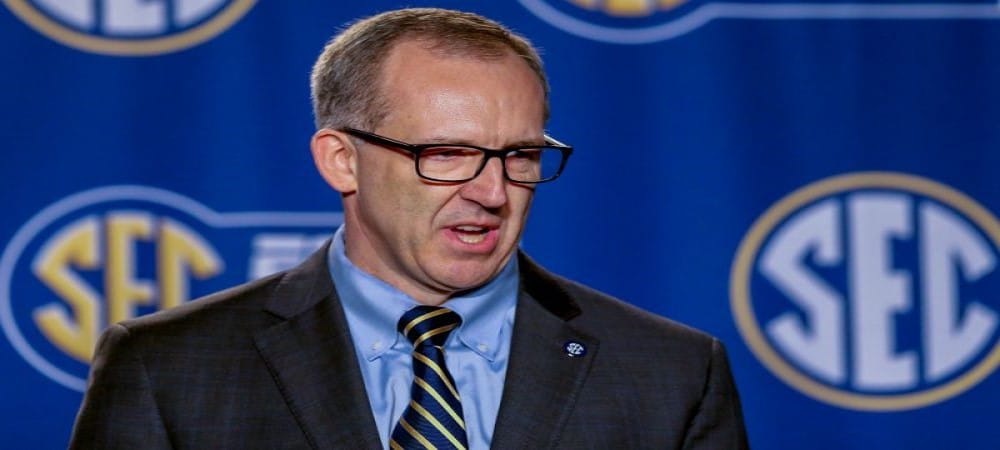- Greg Sankey says that sports wagering is bad for college players’ mental well-being.
- Sankey is on record as advocating for federal sports betting regulations.
- Sankey wants the US government to ban prop and in-game betting in college sports.
TALLAHASSEE, Fla. – As has become a tradition in the southeast, Monday kicked off the football spectacle that is the annual SEC Media Days.
And while most of the discussion was business as usual, SEC commissioner Greg Sankey took the opportunity to speak out against sports betting.
However, Sankey didn’t take the normal tack by suggesting that college athletes are more susceptible to match-fixing schemes than their well-paid professional counterparts. He also didn’t suggest easing that risk by instituting meaningful compensation for college athletes.
Instead, Sankey’s angle is that sports betting is bad for these athletes’ “mental health.”
“We’re seeing trends in the mental health area that should cause us all to pause before these ideas around specific event betting within college sports are allowed to take place,” Sankey said. “And I’m talking about, for example, whether a field goal is made or missed, whether a 3-point try is successful. Is a pitched ball a strike or a ball?”
Sankey didn’t expound on how exactly this kind of sports betting would negatively affect a player’s mental well-being. He cited no medical literature on the subject, nor did he provide any research or other evidence to support his claims.
Contextually, however, it seems that Sankey is suggesting a couple of things here.
First, with legal betting installed, players could be pressured by local match-fixers to intentionally fail at some pertinent task, like kicking a field goal.
This, however, is already a risk. Most local wagering in the US happens via illicit bookmakers. These bookmakers and their representatives already have direct lines to lean on any athletes they choose.
Regulated betting does not imply a greater risk of corruption than unregulated betting, and players that would be targeted to “take a dive” have already long been so targeted.
Second, Sankey might be of the opinion that players would face increased pressure to perform if their actions are being wagered on. The knowledge that strangers are betting real money for or against them could take a toll on athletes’ psyches.
As for this increased pressure to perform, that also fails the sniff test. In the real world, bettor reactions are no different than fan reactions. The stakes, too, are effectively identical.
Using Sankey’s example, let’s say a placekicker is lining up for a field goal attempt. If he makes the attempt, half of the fans are happy, and half of the fans are sad. If he misses the attempt, half of the fans are happy, and half of the fans are sad.
Given that sportsbooks work to get even money on both sides of any given wager, the same is true for bettors. Their interests are evenly split.
If the kicker makes the attempt, half of the bettors get paid, and half of the bettors lose their money. If the kicker misses the attempt, again, half of the bettors get paid, and half of the bettors lose their money.
Is the added pressure from betting action really going to make a difference to athletes that play in front of crowds of 100,000 people (and millions more on national television) week in and week out?
For athletes, is there more pressure when emotional interests hang in the balance, or financial ones?
To the latter point, every college football game is already a big-money affair. From sponsorship and broadcast contracts to ad buys, gate receipts, merchandise sales, and more, the financial interests in athlete performances are already overwhelming at the institutional level.
But more than that, a player’s interest is – or should be – entirely tied up in their and their team’s successes on the stat-line and scoreboard. The pressure of making that field goal because your team needs it is the only operative pressure.
Players whose “mental health” would be deterred by betting (which, of course, already happens on a large scale nationwide) should not be playing, as they’re already hopelessly distracted. For schools to put them out there despite this is already more exploitative than any side effect of sports betting could ever be.
Nevertheless, the solution, according to Sankey, is to federalize gambling laws and ban collegiate in-game and prop wagering.
“Ideally, there would be uniform practices applicable across states throughout the country governing gambling on college sports, particularly eliminating specific in-game betting and proposition bets on college sports,” said Sankey.
How “Mental Health” Could Affect States’ Legal Betting Initiatives
For states that have not yet passed sports betting legislation (including Florida, Georgia, Alabama, and others), Sankey’s alleged concerns could find footing in future proposals.
Though many will characterize Sankey’s assertions as fear-mongering pseudoscience with no factual basis in reality, politicians have long been susceptible to issues predicated on “mental health.”
Still, it seems unlikely that such will hold much water when other more pressing interests are involved.
Take Florida, for example.
In the Sunshine State, home of the SEC Florida Gators, legal sports betting should have been a foregone conclusion. The state has generally friendly gambling laws. Heck, the Miami Hurricanes play in Hard Rock Stadium!
While legalization in Florida is likely, it is unlikely to hinge on any tenuous, unquantifiable claim of athlete mental health. The stakeholders involved in the state – namely the Seminole Tribe of Florida – have actual fish to fry.
That said, Florida Gov. Ron DeSantis has broached the issue of “integrity” concerns with in-game betting. And Tennessee, which recently passed sports betting, has barred NCAA in-game betting for this reason.
It will be interesting to see if any states or elements within the federal government bite on Sankey’s gambit going forward
Advertising Disclosure
In order to provide you with the best independent sports betting news and content LegalSportsBetting.com may receive a commission from partners when you make a purchase through a link on our site.
News tags: Alabama | Florida | Greg Sankey | mental health | NCAA | Ron DeSantis | SEC | SEC Media Days | Seminole Tribe of Florida

Andy has been writing professionally for nearly two decades, with the last three years being dedicated to his primary passions: sports wagering news and gambling industry analyses. A walk-on punter, Andy has a particular interest in professional football, baseball, and horse racing betting. Come early May, you can always catch Andy – clad in all white, mint julep in hand – on Millionaires Row at Churchill Downs. In his dreams.



 College Football Betting
College Football Betting Best Online Sports Betting
Best Online Sports Betting Best Legal NFL Betting
Best Legal NFL Betting States With Legal Sports Betting
States With Legal Sports Betting Sports Betting Events
Sports Betting Events




